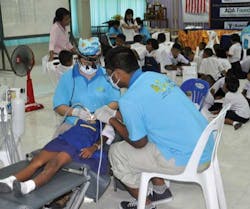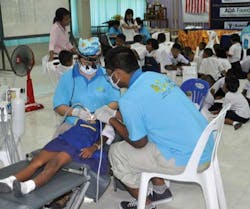Dentistry's missionaries gather
Notes from the ADA Symposium on volunteerism
by Patricia Walsh, RDH, BS
A two-day seminar limited to 50 preregistered participants took place in Orlando prior to the start of the ADA Annual Session. Despite a Disneyesque title, "The Adventure Beyond Your Office," it was far from being a "what I did on my summer vacation" travelogue. The symposium provided attendees with information, tools, and the networking needed to further assist the staggering 65% of the world's population that goes without regular dental care.
As a dental hygienist who has been an advocate for the dental health of rural Thai children these past four years, it was an opportunity for me to adjust my educational compass and learn from experts who brought with them a tremendous amount of diverse global experience. If there is such a thing as the United Nations of dental volunteering, it was hosted in an Orlando Hilton conference room on October 7, 2010.
The session moderator was Dr. Sally Hewett from Washington State whose personal experience in Laos was of particular interest to me, since it borders Thailand. The ADA Foundation supports teaching experiences for doctors wishing to volunteer in Laos as well as the nondenominational mission trips that visit the Thai school I represent.
The symposium began with an interactive sensitivity training session led by Susan Berryman, a former University of Arizona medical school faculty member. Berryman provided us with a multicultural experience, which proved to be a terrific icebreaker as well. (I hadn't seen that many dental professionals with chips and cards in their hands since the last Connecticut dental meeting at Mohegan Sun Casino.)
Cultural differences can often cause a breakdown in communication that, in turn, slows the delivery of aid to the underserved. From a personal perspective, more than three years passed before I learned that even many educated Thais believe that orphans carry bad karma. Superstitious doctors believed that assisting tsunami survivors would bring bad fortune onto themselves.
The lecturers provided us with information about American volunteer experiences as well as those abroad. Dr. Elaine Miginsky spoke about her years of experience working with Native Americans. Dr. Terry Dickinson, the recipient of the ADA Humanitarian Award at the association's general session, provided us with a nuts-and-bolts background look at his Mission of Mercy events. Dr. Martin Hobdell, professor of epidemiology at University College in London, shared "what works and what doesn't work" in the Philippines with regard to a successful dental program.
The universal theme was the need for true sustainability of dental care projects. Education of local health providers trumped the need for delivering modern Western style dental care. Recognizing that schools are often the center of community activities, health education needs to be integrated on the local level beyond our jumbo plastic teeth models. The jumbo teeth may be great fun for presenting; however, statistically speaking according to Dr. Chris Holmgren of Aide Odontologique Internationale, this type of instruction does not reduce the local population's decay rate.
Also, training dental auxiliaries to become self-sufficient is a better use of resources than facilitating anterior composites. Dr. Habib Benzian of the FDI World Federation once wrote, ''Mahatma Gandhi said, 'It may be that you can do very little. But it is important that you do that very little.' But it should be the best possible little."
A global perspective of dental volunteering was provided by Dr. Holmgren who had flown in from Paris. A proponent of the usage of atraumatic restorative treatment (ACT), he was previously known to me as the author of the WHO guide to field dentistry.
Anil Parajuli provided us with information on the evolution of his Himalayan health-care services. Providing dental care to individuals in remote areas of the world during tumultuous political times made for a fascinating presentation on Tibet. I had worked for years to recruit dentists to volunteer at the R35 school in Thailand only to have my first American doctor cancel two weeks prior to his trip. Bangkok had erupted in flames with mass rioting (he has since rescheduled for early this year).
The demanding logistics of providing those in need with appropriate care and appropriate supplies is a common thread from the flatlands of Arizona to the mountains of the Philippines. All of us relate to the multitude of mistakes made at the beginning of our volunteering experiences. We collectively reassured seminar participants who were about to embark on their first adventure outside the office that, while perpetual flexibility is the key, one individual really can make a difference.
During the opening session, a moment of silence was observed to honor Dr. Phil Grams of Colorado who lost his life to the Taliban while on a volunteer dental mission to Afghanistan.
More information about international volunteer experiences for dental hygienists can be obtained at the ADA Web site (www.internationalvolunteer.ada.org), Himalayan Health Services (www.himalayan-healthcare.org), or Smiles on Wings (www.smilesonwings.org).
Patricia Walsh, RDH, BS, is a graduate of the Fones School and the University of Bridgeport. She may be contacted at [email protected].
Past RDH Issues

